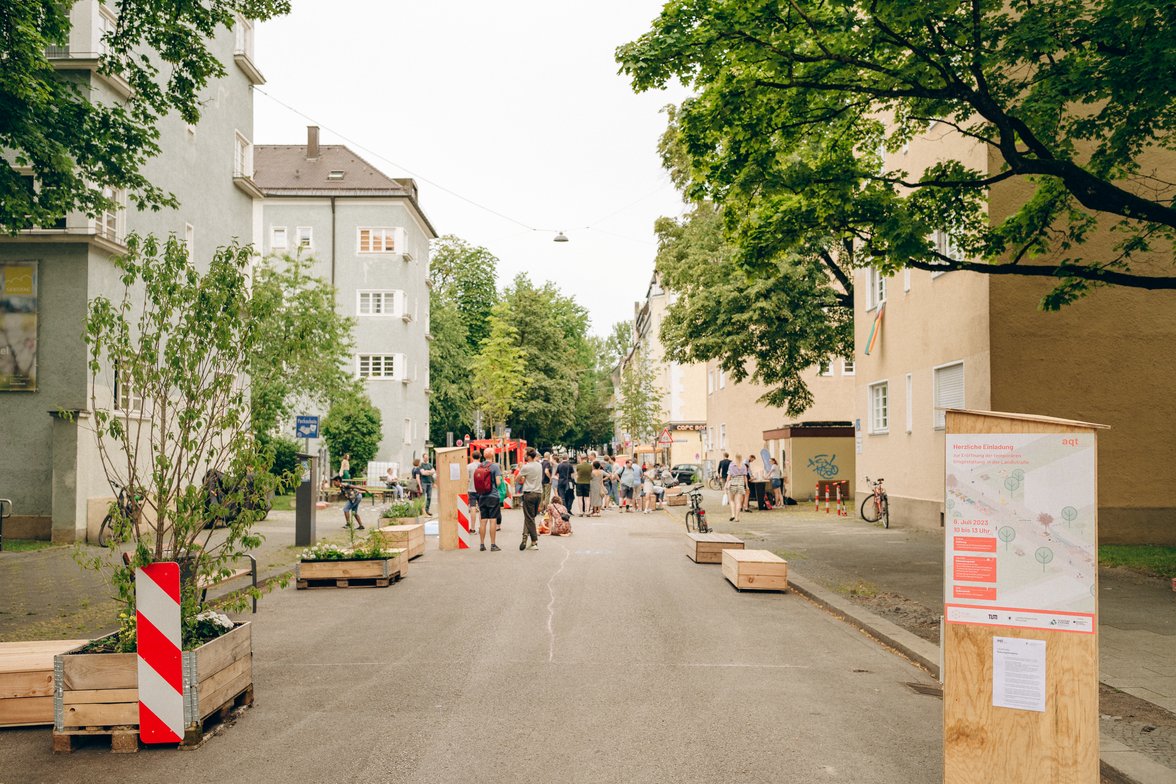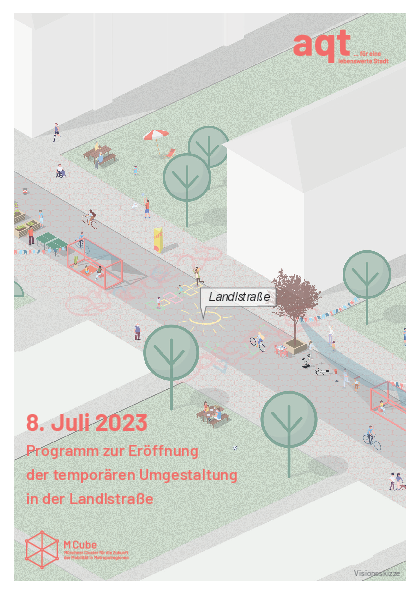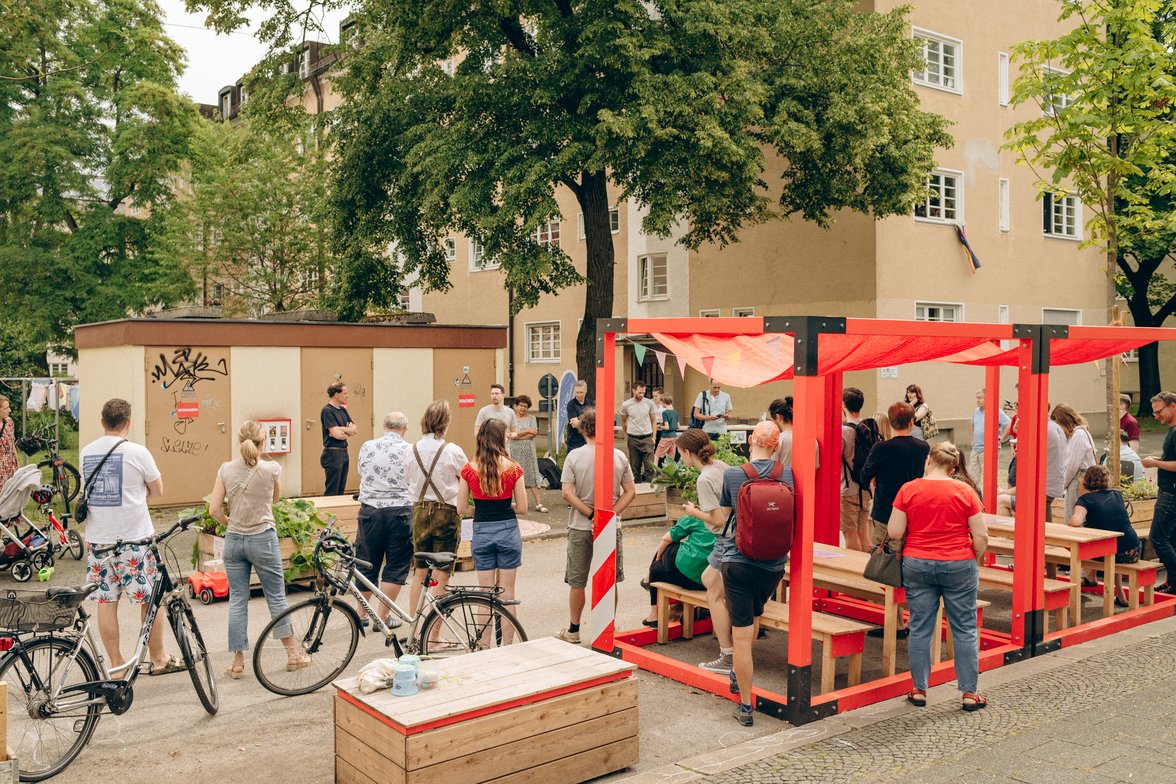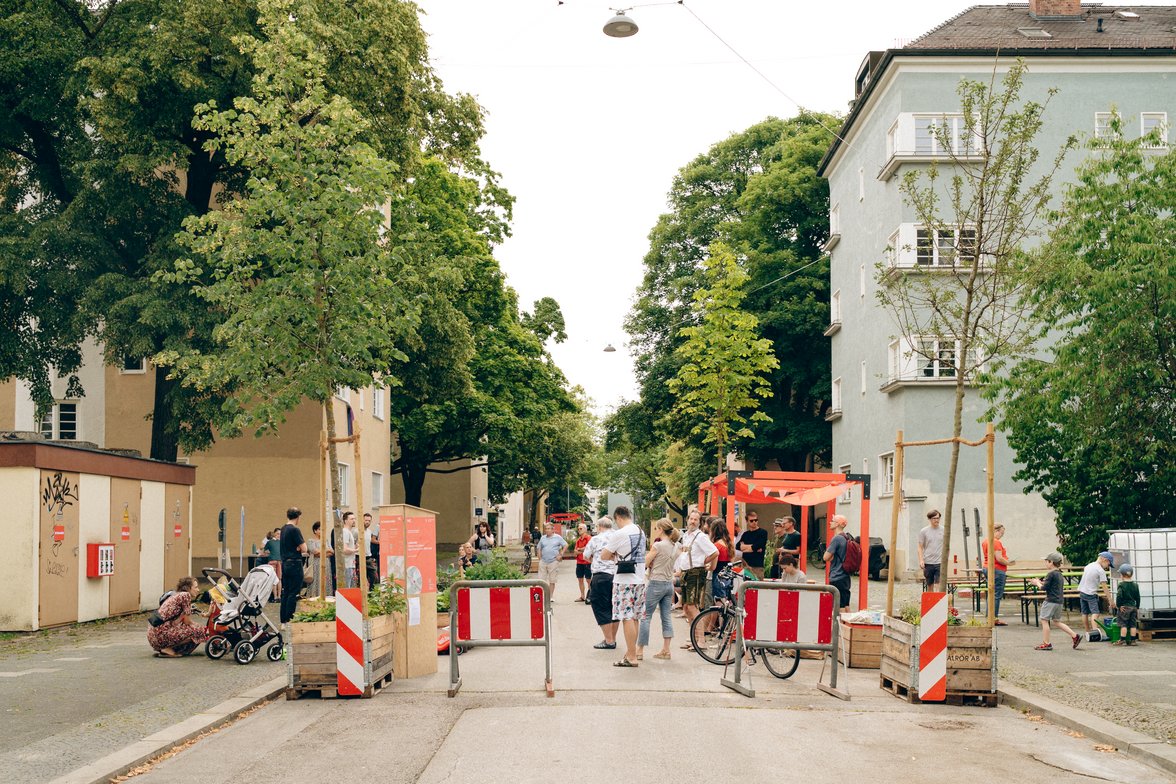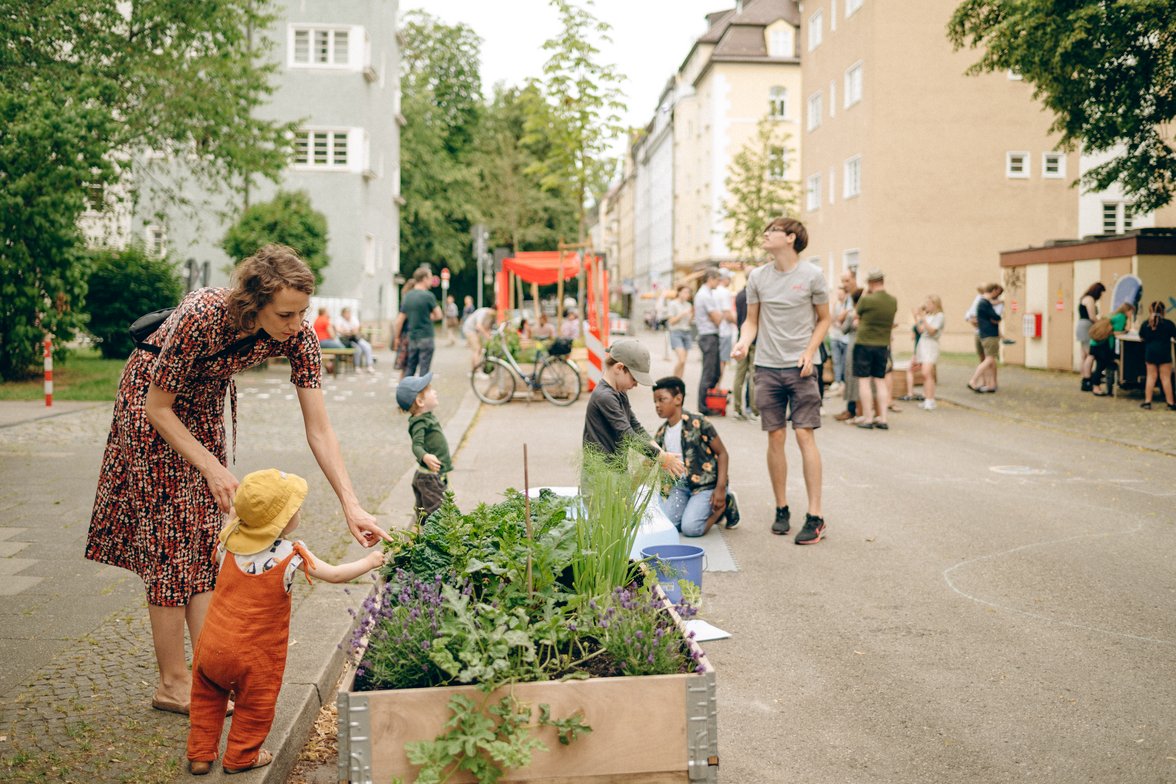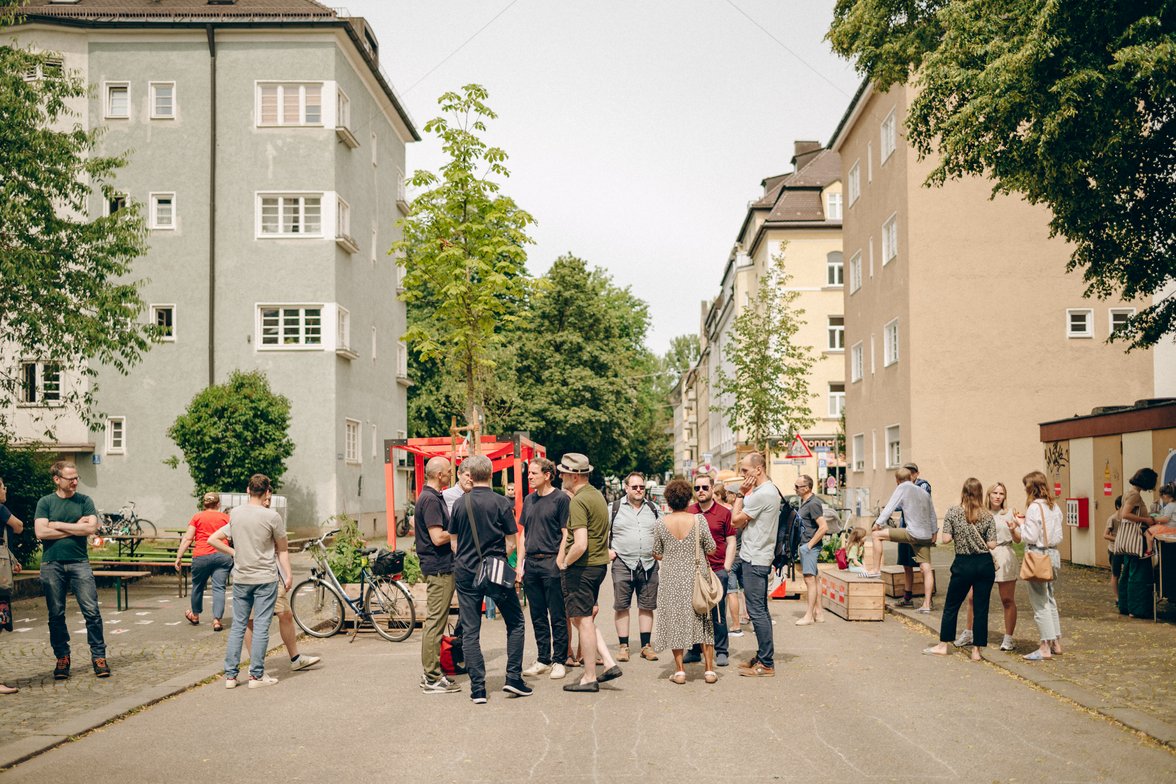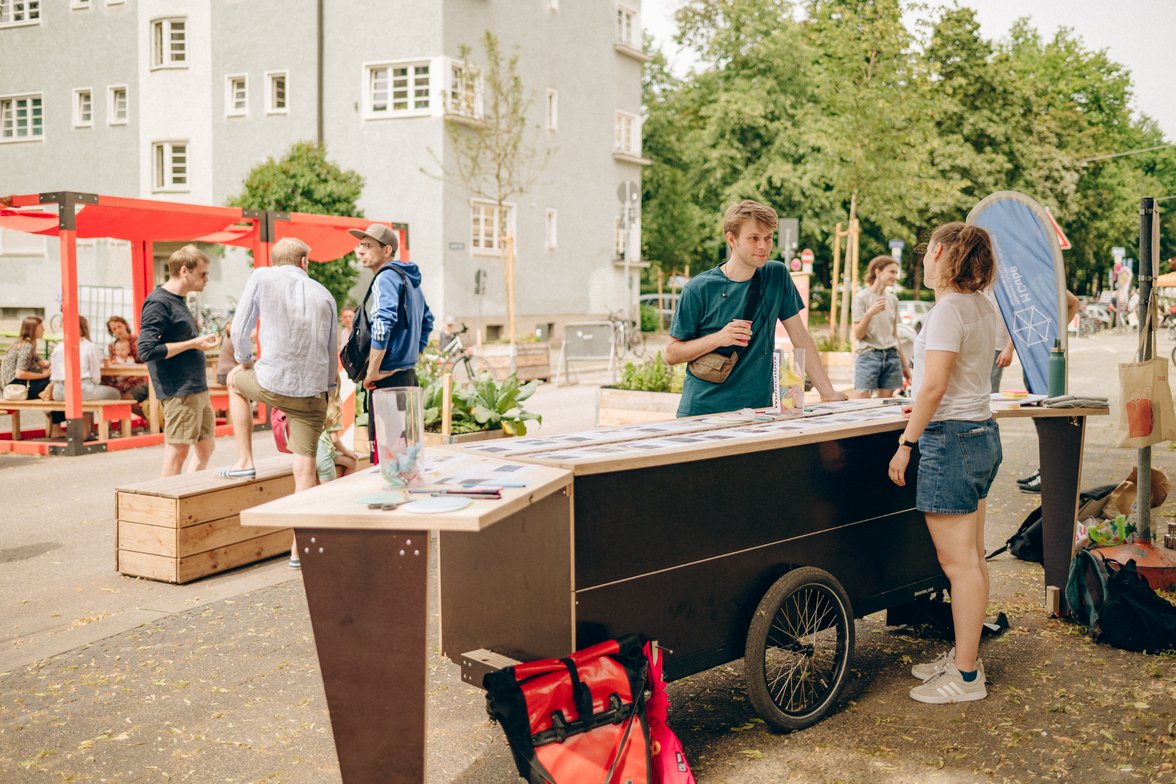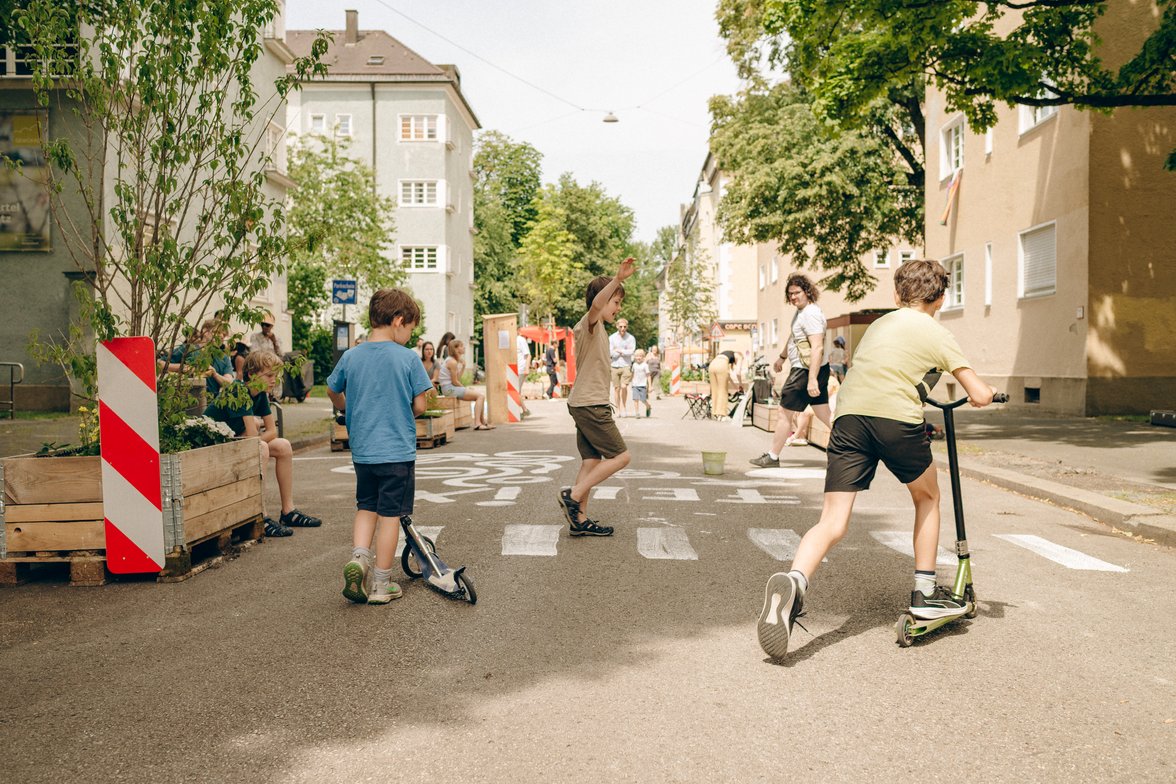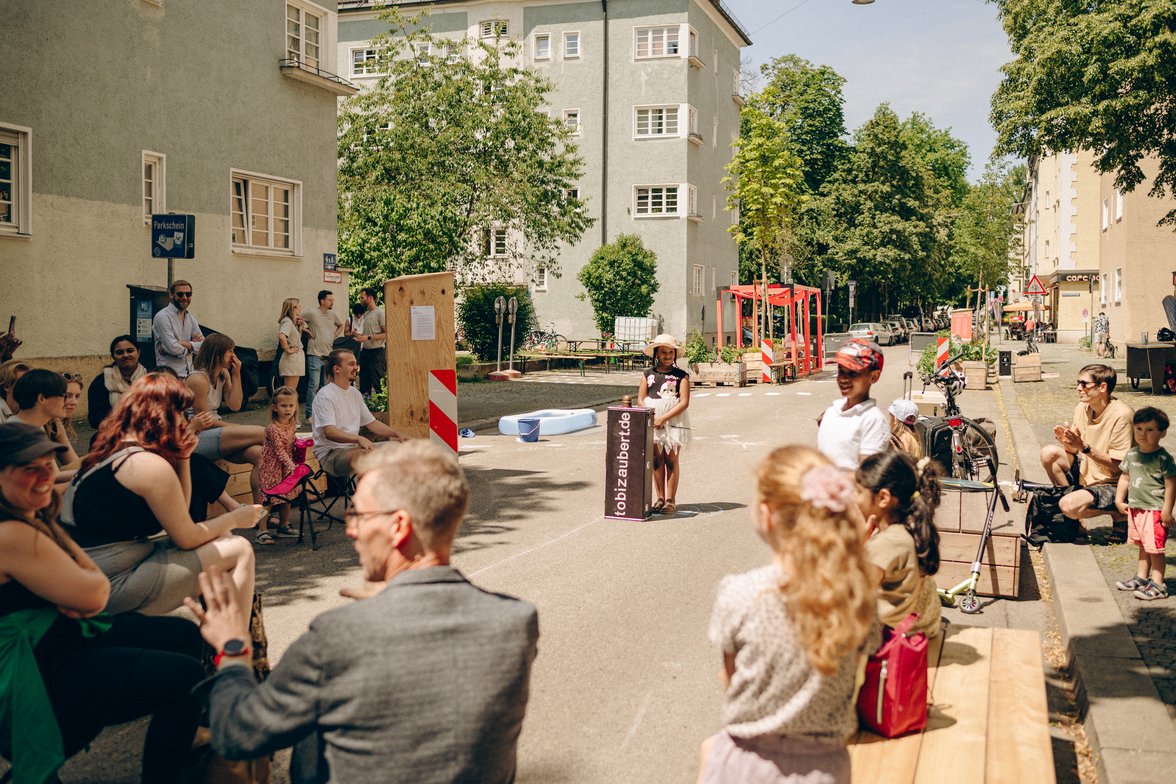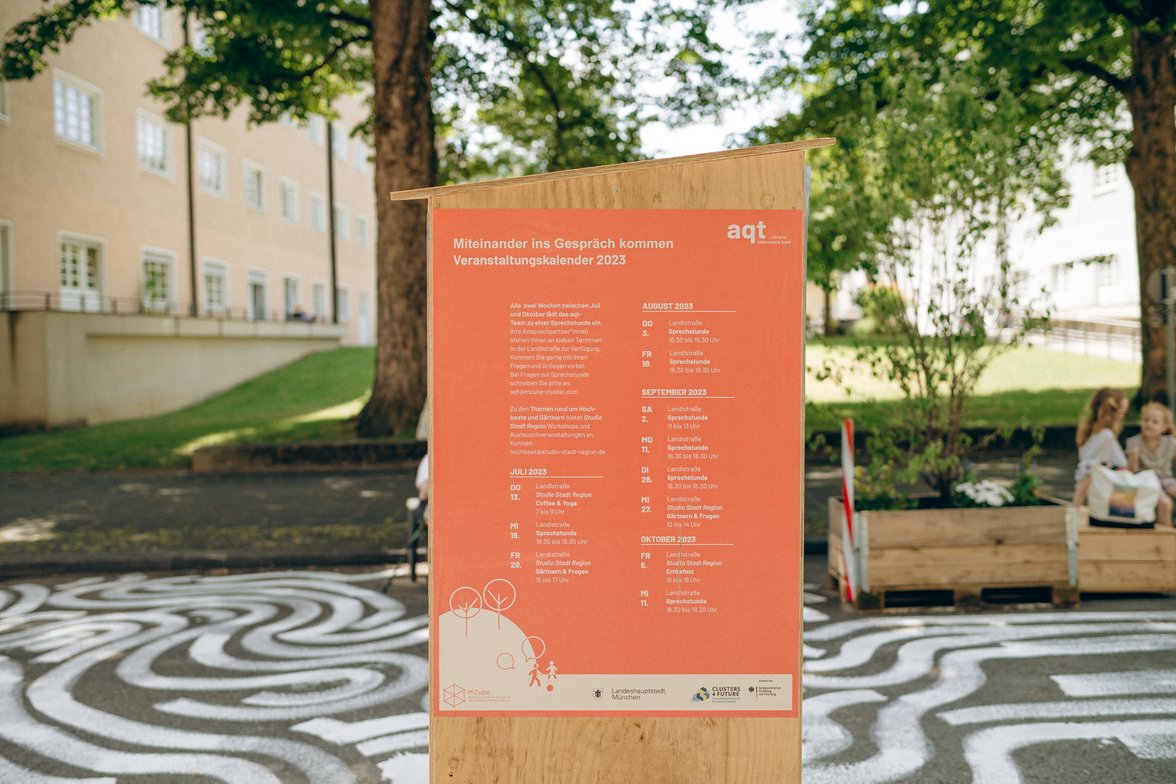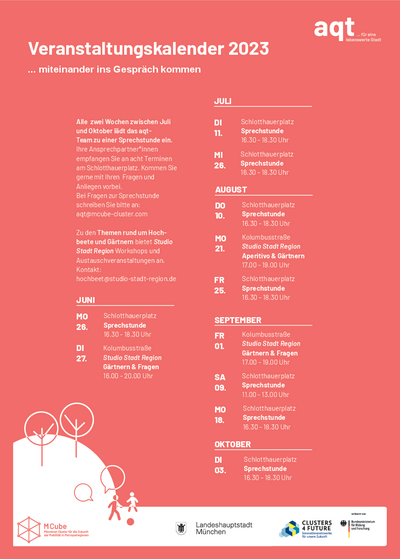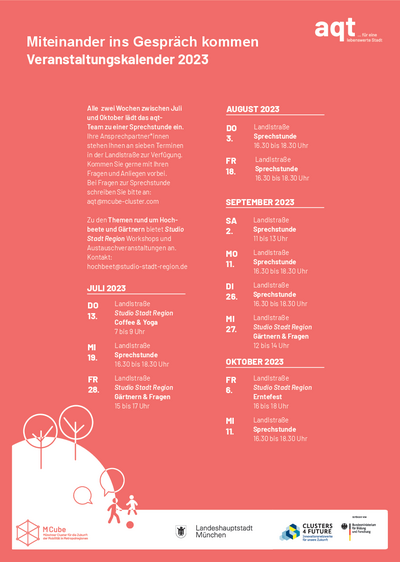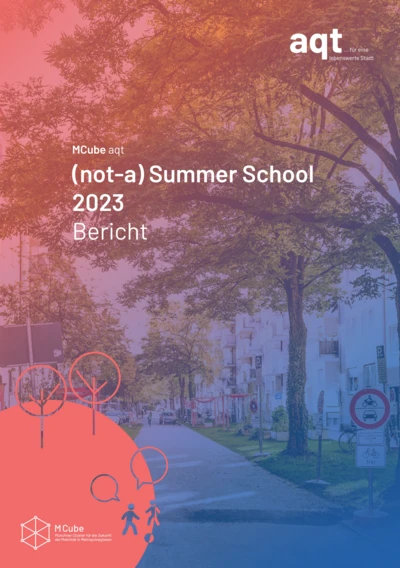MCube aqt – Car-reduced neighborhoods for a livable city
Transformative research for future mobility in urban neighborhoods
In the MCube aqt (car-reduced neighborhoods for a livable city) innovation project, the Technical University of Munich (TUM) collaborated with the City of Munich (LHM), Munich City Utilities (SWM), the Hans Sauer Foundation, UnternehmerTUM, and other partners to research mobility in urban neighborhoods.
Climate change and increasingly dense urban development are affecting our mobility behavior. A redistribution of available open spaces is necessary. Together with local stakeholders, we sought solutions for what urban neighborhoods could look like in the future. What opportunities does this create for the neighborhood? How can mobility in the neighborhood be made fairer and safer while also being convenient? Together, we developed and tested various building blocks of neighborhood development to ultimately arrive at a modified neighborhood model. In doing so, we researched processes and measures and evaluated them with a view to transdisciplinary cooperation and future urban and mobility design challenges.
Duration: November 2021 – November 2024
Funding body: BMBF – Clusters 4 Future, MCube: Munich Cluster for the Future of Mobility in Metropolitan Regions
The study examined the influencing factors from actors and networks, spatial and cluster structures, and decision-making and planning processes. A special focus was placed on transdisciplinary research work and transformative processes. Wherever possible, stakeholder interests, political hurdles, and spatial quality were taken into account. The basic assumption of the research activities was that mobility change is a very complex topic. It involves a combination of new forms of mobility, people's everyday routines, and a revival of neighborly coexistence. Not only rational factors, but also emotional or “soft” factors had to be considered. Against the backdrop that individual technical solutions have not yet initiated the necessary change towards an ecologically and socially sustainable transport transition or led to a measurable reduction in individual motorized transport, design, transport, and usage-related potentials for the conversion of traffic areas have now been opened up that are important for sustainable and climate-adapted urban development in the course of advancing urbanization. Thus, transferability to other cities also played a role. The research partners gained process knowledge and evaluated it in relation to future teaching, research, and planning projects as well as decision-making processes.
Chair of Urban Design, Prof. Dr. Benedikt Boucsein
Mareike Schmidt, M.Sc. Architecture with a focus on urban planning
Marco Kellhammer, M.Sc. Industrial Design;
Contact: mareike.schmidt(at)tum.de
Chair of Urban Structure and Transport Planning
Chair of Traffic Engineering and Control
Chair of Transport Systems Engineering
Chair of Automotive Technology
City of Munich
Stadtwerke München GmbH
UnternehmerTUM GmbH – DigitalHub Mobility
Hans Sauer Foundation
Associated partners: VEOMO GmbH, ChargeX GmbH, TIER GmbH, SIXT AG, Bayerische Hausbau
The project consortium began work on the research project in November 2021. In addition to identifying opportunities and challenges in transformation processes, involving relevant stakeholders, and promoting interdisciplinary cooperation between science, administration, business, and civil society, the selection of at least two different neighborhoods is part of the research process. With the participation of research partners and civil society, needs, hopes, and fears in the context of the mobility transition were later identified and translated into concrete spatial measures. The aim of this first participation phase was to design measures that were tested and evaluated as a real-world laboratory in the summer of 2023. The Munich City Council approved the implementation of pilot projects for the mobility transition in its resolution of June 1, 2022.
Research conducted in collaboration with civil society enabled transformative effects. In addition, specific existing urban neighborhoods were examined in the context of the mobility transition. Spatial potentials were subsequently categorized and evaluated for their transferability. The parking license areas of the LHM Mobility Department served as an outline and neighborhood definition. The study areas were to be located within the middle ring and outside the old city ring. The project areas sought should not overlap with areas already covered by previous research projects. Neighborhoods in which a neighborhood development project had been implemented in the previous five years were excluded from selection. Similarly, only neighborhoods in which no major infrastructure or construction measures were planned during the research period were suitable. Suitable neighborhoods were examined for the following characteristics and compared with each other:
- Residents, residential units, proportion of progressive Sinus-Millieus, proportion of conservative Sinus-Millieus
- Parking spaces, resident parking spaces, motor vehicles, private motor vehicles
- Neighborhood area within a 300/600 m radius of subway, tram, or light rail stops, proportion of traffic area to total area, average speed, parking pressure, open space, proportion of green space
- Political composition of the district committee, motions in the context of mobility and neighborhood development in the district committee
The shortlist was agreed upon with the project participants from LHM, TUM, and SWM. The district committee bodies of the neighborhoods concerned were then contacted and the potential and possibilities for cooperation were discussed in a meeting and presented to the Mobility Subcommittee. Finally, the district committees BA17-Obergiesing Fasangarten on March 14, 2023, and BA5-Au-Haidhausen on March 15, 2023, decided to conduct a real-world laboratory in each of the proposed project areas.


Once the project areas had been selected, local participation could begin. Residents in the two project areas were informed about the research project in September 2022 via an information letter.
A two-week summer school with students was held in September as part of the research project. Observations were made, seating and recreation areas were mapped, counts of park usage were taken, and interviews with people in public spaces were conducted. A multi-stage participation strategy was developed in collaboration with the Hans Sauer Foundation.
From December 2022 to April 2023, eight participation and information events took place on site and two online events. The events were primarily advertised via notices posted on front doors. Residents' wishes, suggestions, and concerns were documented. Additional feedback was gathered from surveys, emails, and letters posted in mailboxes. From February 4, 2023, to March 31, 2023, a temporary curling rink was set up in both neighborhoods. How can we share parking spaces in winter? The intervention was intended to draw attention to the research project and highlight the potential of public space. Use of the space was free of charge.
Feedback from this participation phase, which focused on information and consultation, was continuously incorporated into the planning of measures for the summer.
The research team is currently working on publishing the results from the first participation phase.
Südliche Au, Munich
After the measures had been planned and approved, residents were informed on June 1, 2023, about the specific measures, the conversion of parking spaces into recreational areas, and compensatory measures. More parking spaces in the neighborhood were converted into residents-only parking. All access roads and driveways remained accessible. Utility and emergency services were still able to drive on Kolumbusstraße, as were cyclists. Motorists were unable to drive on the road in an area of approximately 50 meters. The adjacent area was made traffic-calmed. As part of the research project, three mobility points were set up at the same time as the opening, which will remain in place permanently.
This meant that the trial could begin over the summer. In the Südliche Au district, the real-world laboratory was opened with a launch party on June 17, and the redesigned streets and traffic areas were ceremoniously handed over to the residents.
The measures to be tested in the southern Au area concern two neighborhood squares – Entenbachplatz and Schlotthauerplatz – as well as Kolumbusstraße and Edlingerplatz at the Kolumbusstraße subway station.
Walchenseeplatz
Residents of Landlstraße were also informed at the beginning of June about the specific measures affecting the Landlstraße area. Parking spaces for mixed parking were also converted to residents-only parking. All access roads remained accessible. The section of road was open to bicycle and pedestrian traffic. Adjacent short-term parking zones were set up, e.g., for delivery services or nursing staff. On July 8, the section of road was opened to residents.
Both real-world laboratories were to remain in place until October 31, 2023. Due to a lawsuit against the City of Munich for each project area, a court settlement was reached. The two real-world laboratories were therefore dismantled on October 25.
The two real-world laboratories were at the heart of the participatory research process. The consultation formats developed in the participation strategy were supplemented by campaigns and activities in the neighborhood. With the support of Studio|Stadt|Region, a diverse program was successfully implemented. The level of participation among the residents involved was very high. Some feedback was received over the course of the summer, and the measures were adjusted accordingly. The temporarily created open spaces were used in a variety of ways – from raised bed gardening to sunbathing lawns and picnic areas.
Discussions during consultation hours, comments on feedback cards or via email, observations, measurements, and workshop results are currently being evaluated. Publications on the data are planned for summer 2024. The research results will then be presented and discussed not only scientifically but also in the neighborhoods.
The MCube aqt Summer Schools took place in September 2022 and October 2023. The participating students from the
Technical University of Munich (TUM) came from a variety of degree programs: architecture, urban planning, transportation planning, civil engineering, and others. In this interdisciplinary setting, students from the Technical University of Munich spent two weeks learning about exploratory research methods and conducting research on the topic of “car-reduced neighborhoods.” To better understand this complex subject matter, they focused on two Munich neighborhoods, learned about their unique characteristics, and jointly collected data on the neighborhoods included in the project.
While the 2022 summer school focused closely on the issues addressed by the MCube aqt project, the 2023 summer school focused on the topic of “science communication.” Within this framework, the students iteratively tested various smaller interventions and communication methods in order to successfully convey complex facts in direct exchange with people. As a starting point,
they used scientific findings and popular counterarguments on the mobility transition. At the end of the nearly two weeks, the students presented their prototypical interventions to the public. This report documents and reflects on the results and serves as a blueprint for future learning formats.
Detailed reports can be found here (German):

Let's assume that fewer cars are normal...
What changes when we create more space for people in the city and reduce car traffic? And what will that look like in the future?
Only when we know where we want to go in the future can we act accordingly and enable participation. In July 2023, two-day workshops were held with 13 citizens of Südliche Au. After an introduction on what the future is (and isn't), the first day was spent discussing the assumption that fewer cars are normal. How would this affect our daily errands, our leisure time, our health, our social life, our careers, and our education? Three illustrators supported the workshop teams in developing visions of the future for Munich in 2035. On the second day, we asked ourselves what would be desirable in the scenarios we had developed together and what would not. What future stories from people's everyday lives are told in the scenarios?
The scenarios and stories were clustered, actors developed, and further refined into five visions of the future, which were presented on October 7 as part of the Future Forum. Three neighborhood dialogues took place within this framework. Residents were invited to take part in these dialogues and assume their roles in the year 2035.
This work package is part of the MCube aqt and TrEx research projects in cooperation with the Faculty of Design at Munich University of Applied Sciences.

The MCube aqt real-world laboratories were accompanied by two detailed questionnaire studies. One survey was conducted in May 2023 before the real-world laboratory was implemented, and another in October 2023 at the end of the real-world laboratory. In addition, micro- and macroscopic simulations were carried out, and interviews and focus groups were conducted, among other things.
All results to date can be found in the results report published by the City of Munich and the Technical University of Munich: Car-reduced neighborhoods for a livable city. Results from the aqt research project or in the publication list (see below).
Status: 29 August 2025
Own publications:
- Landeshauptstadt München, Technische Universität München (Hrsg.). (2024). Autoreduzierte Quartiere für eine lebenswerte Stadt. Ergebnisse aus dem Forschungsprojekt aqt. http://muenchenunterwegs.de/aqt-ergebnisse
- Kellhammer, M., Schmidt, M., Aumann, S. (Hrsg.). (2024). MCube aqt Summer School 2022: Bericht. MCube / Technische Universität München. https://mediatum.ub.tum.de/1738160
- Schmidt, M., Aumann, S. und Adamidis, F. (Hrsg.). (2024). MCube aqt (not-a) Summer School 2023: Bericht. MCube / Technische Universität München. https://mediatum.ub.tum.de/1739087
- Ruf, S., Kellhammer, M. & Mandir, E. (2024). Und jetzt? Zukunftsbilder Münchner Bürger*innen für die Mobilität von morgen. Szenarien-Buch. München: TechnischeUniversität München. https://mediatum.ub.tum.de/604993
Journal and conference contributions
- Adamidis, F. Ghaffari, S. M. & Antoniou, C. (2023). Acceptance of car-reducing measures: observed factors and latent attitudes [Konferenzbeitrag]. hEART, Zurich.
- Adamidis, F., Al Haddad, C., Antoniou, C. (2024). Modeling Transportation Mode Choices under Private Car Use Constraints [Konferenzbeitrag]. TRB Annual Meeting, Washington.
- Adamidis, F., Al Haddad, C., Antoniou, C. (2024). Mode choices under car-reducing scenarios: Measurable factors and latent attitudes [Under review]. Travel Behaviour and Society.
- Aumann, S. (2025). Das Forschungsprojekt MCube aqt - Autoreduzierte Quartiere für eine lebenswerte Stadt—VCD Debatte. (2025, February 18). https://www.youtube.com/watch?v=S2kDGmF_Cko
- Aumann, S., Schmidt, M., Ruf, S. (2024). Exploring liveability in car-reduced neighbourhoods: Lessons from an urban living lab in Munich [Konferenzbeitrag]. RGSIBG Annual Conference, London.
- Aumann, S. & Ruf, S. (2024). Not in my street: Acceptance of car-reducing street experiments in existing neighborhoods [Konferenzbeitrag]. AESOP Annual Congress, Paris.
- Aumann, S. (2024). Didactic Byte: Learnings aus der Evaluation eines Reallabors [Konferenzbeitrag]. DVWG Summit “Reallabore: Von der Forschung in den Alltag”, Wuppertal.
- Aumann, S. & Kinigadner, J. (2024). Wem gehört der öffentliche Raum? Reflexion zum Forschungsprojekt Autoreduzierte Quartiere für eine lebenswerte Stadt. PLANERIN, 2, 52-54.
- Aumann, S. (2023). Wie können Reallabore zu nachhaltigem Mobilitätsverhalten und Einstellungsänderungen städtischer Bewohner:innen beitragen? Eine Analyse des Status quo in zwei Münchner Quartieren [Konferenzbeitrag]. 18. Jahrestagung des Arbeitskreises „Mobilität und Verkehr“ (AK MoVe), Frankfurt.
- Aumann, S., Kinigadner, J., Duran‐Rodas, D., Büttner B. (2023). Driving Towards CarIndependent Neighborhoods in Europe: A Typology and Systematic Literature Review. Urban Planning, 8(3). https://doi.org/10.17645/up.v8i3.6552
- Aumann, S. (2022). Car-free, car-reduced, or what? A comprehensive literature review. Urban Transition, Integrating urban and transport planning, environment and health for healthier urban living [Konferenzbeitrag]. Urban Transitions, Sitges.
- Glogar, I., Boucsein, B., Kellhammer, M., Ruf, S., Schmidt, M. (2023). Towards a collaborative approach in urban design education. Dimensions - Journal of Architectural Knowledge .
- Herbst, T., Lienkamp, M. (2025). Revealing Hidden Demand in Free-Floating Shared Mobility Systems Using Voronoi Tessellation [Konferenzbeitrag]. TRB Annual Meeting, Washington.
- Kellhammer, M., Zwangsleitner, D., & Boucsein, B. (2022). Ein Baustein der Mobilitätswende? Die Projekte AQT und TrEx im Forschungscluster Mcube. Standpunkte. Münchner Forum (Mobilitätswende in München).
- Kellhammer, M. (2023). Co-designing futures of mobility; How to design „What if...?“ [Konferenzbeitrag]. 6th Nordic STS conference, Oslo, Norwegen; Panel Session: Bridging STS & Design Research – Designing Interactions, designing the SocioTechnical
- Kellhammer, M., Preiss, S. (2024). Reallabore als Instrument urbaner Transformation im Kontext Mobilität. [Konferenzbeitrag]. „Reallabore – ExperimentierRäume für den Weg in eine nachhaltige Gesellschaft“; Leibniz-Institut für ökologische Raumentwicklung. Dresden.
- Kellhammer, M., Jung M., Jarras, J. (2024). Reallabore der Mobilität – Dialog zu Regulierung, Wunsch und Realität [Konferenzbeitrag]. Reallabortagung Dresden
- Kellhammer, M. (2024). Panelist [Konferenzbeitrag]. DVWG-Summit – Reallabore: Von der Forschung in den Alltag.20
- Kellhammer, M., Aumann, S. (2023). Learnings aus der Kolumbusstraße [Konferenzbeitrag]. MCube Speaker Series. München.
- Kellhammer, M. (2024). Revealing Uncertainties: The role of urban living labs for systemic design [Konferenzbeitrag]. RSD13, Oslo.
- Kellhammer, M.; von Schirnding de Almeida, E. (2024). Unveiling Urban Design Thinking Dynamics: Participation Formats and Communication Strategies in Experimental Urban Pop-Up Projects and Living Labs to Foster Livable Cities [Konferenzbeitrag]. AMPS Livable Cities – Proceedings, London.
- Kellhammer, M. (2025). Revealing Uncertainties: The role of urban living labs for systemic design. Proceedings of Relating Systems Thinking and Design. Systemic DesignAssociation
- Kellhammer, M., Schmidt, M., Adamidis, F., Aumann, S., Boucsein, B., Herbst, T., Preiß, S., & Ruf, S. (2025). Capturing complexity – applying and reflecting on the case reporting scheme in a real-world laboratory on car-reduced neighborhoods in Munich. Urban Transformations, 7(1), 1–23. https://doi.org/10.1186/s42854-025-00080-y
- Schmidt, M., Hamm, L., Kellhammer, M., Schmid, W. (2022). Contributing to more just cities with living labs? - An investigation of decision processes [Konferenzbeitrag]. AESOP Annual Congress, Species for Species: Redefining Spatial Justice, Tartu.
- Schmidt, M. (2022). Diskussion: Wem gehört die Stadt?. 7. Architekturwoche Stadt:Leben. BDA. München. Panelist [Konferenzbeitrag].
- Schmidt, M. (2023). Aus der Mücke (k)einen Elefanten machen – Für wen steigt der Lebenswert durch die urbane Verkehrswende? [Konferenzbeitrag]. 18. Jahrestagung des Arbeitskreises "Mobilität und Verkehr" (AK MoVe), Frankfurt.
- Schmidt, M. (2023). Lohnt sich der 'aqt'? Erfahrungen aus dem Reallabor „autoreduzierte Quartiere für eine lebenswerte Stadt” in München [Konferenzbeitrag]. KoMet-Tag, Essen.
- Schmidt, M. (2023). Meer openbare ruimte voor Munchen?. AGORA Magazine 39 (4)
- Schmidt, M. (2024). LAtalks. Salongespräche „Grün um jeden Preis (?)“ - Teil 2 – Bund Deutscher Landschaftsarchitekt:innen. München. Panelist [Konferenzbeitrag].
- Schmidt, M. (2024). To approve or not to approve - The role of polarization in street experiments [Konferenzbeitrag]. mobilTUM 2024, München.
- Schmidt, M. (2024). And they lived happily ever after (when the Urban Living Lab was finally over) [Konferenzbeitrag]. 18th AESOP Young Academics Conference: Book of Abstracts: Bridging Gaps: Urban Planning for Coexistence, 2024, Milano.
- Schmidt, M. (2024). Here, There And Everywhere – Negotiations On The Redistribution Of Street Space. [Konferenzbeitrag] AESOP Annual Congress 2024, Paris.
- Schmidt, M. (2024). Learnings aus der Kolumbusstraße [Konferenzbeitrag]. Kreisjugendring München-Stadt Fachtag: Recht auf Spielstraße. München.
- Schreibmüller, J., Aumann, S., Preiß, S., & Kinigadner, J. (2025). From Car-Dependent to Public Space Enthusiast: How can a typology of attitudes help to understand social acceptance of street space reallocation projects? Transportation Research Interdisciplinary Perspectives, 30, 101370. https://doi.org/10.1016/j.trip.2025.101370
Exhibitions
- Ergebnisse aus dem Forschungsprojekt aqt. (2023). München. Referat für Stadtplanung und Bauordnung. Mobile Ausstellung zu Ergebnissen aus dem Forschungsprojekt aqt. (2023). München.
- The IAA MOBILITY 2023. Open Space (2023). München. Retrieved 14 May 2025, from https://www.iaa-mobility.com/en/visitors/the-iaa-mobility-2023
- Übern Zaun—Gärten und Menschen. (2025-2027). Zeitgeschichtliches Forum. Leipzig. Retrieved 14 May 2025, from https://www.hdg.de/zeitgeschichtlichesforum/ausstellungen/uebern-zaun-gaerten-und-menschen
- What the City. Perspektiven unserer Stadt. (2025-2027). Münchner Stadtmuseum. München. Retrieved 14 May 2025, from https://www.muenchnerstadtmuseum.de/programm/what-the-city-perspektiven-unserer-stadt
- Zukunft der Mobilität - Einblicke in Münchens Mobilitätsforschung. (2024). Verkehrszentrum Deutsches Museum. München. https://www.deutschesmuseum.de/verkehrszentrum/aktuell/medientisch-einblicke-in-muenchensmobilitaetsforschung
Podcasts
- Cohrs, C. (2025.). Wie Parkraum zu Lebensraum wird. The Passenger – Die Zukunft der Mobilität. Retrieved 14 May 2025, from https://the-passenger.podigee.io/9-marcokellhammer
- Strobel, A. B. (2025.). Verkehrsberuhigte Stadt—Wie sie gelingen kann—Radiowissen. BR Podcast. Retrieved 14 May 2025, from https://www.br.de/mediathek/podcast/radiowissen/verkehrsberuhigte-stadt-wie-siegelingen-kann/210465519
Further publications:
- Aumann, S. Schmidt, M. (2025), Autoreduzierte Quartiere für eine lebenswerte Stadt. Ergebnisse aus dem Forschungsprojekt aqt, SRL-FMV AK Nahmobilität, München
- Schmidt, M. (2025), Autoreduzierte Quartiere für eine lebenswerte Stadt. Ergebnisse aus dem Forschungsprojekt aqt, Spielraumkommission, Referat für Stadtplanung und Bauordnung, Landeshauptstadt München




